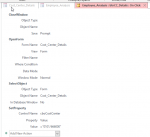Hello,
I am trying to set the Value of a DropDown with a Macro. It does not work, giving me the error: "The control name XXXX is misspelled or refers to a control that doesnt exist". So I simplified it to test changing the control on the same form.
If I fill:
it works and changes the value of the DropDown. But as soon as I try to reference the object with its complete path it does not work anymore. In the examples I have seen online it seems it should work with: [Forms]![Employee_Analysis]![cboFunction]. However it doesn't. I have also tried:
Forms!Employee_Analysis!cboFunction
[Forms].[Employee_Analysis].[cboFunction]
Forms!Employee_Analysis!cboFunction
Nothing works. Why? How can you reference a control that is on a different Form inside of a Macro Action?
Thanks. I attach the error message.
I am trying to set the Value of a DropDown with a Macro. It does not work, giving me the error: "The control name XXXX is misspelled or refers to a control that doesnt exist". So I simplified it to test changing the control on the same form.
If I fill:
Code:
SetProperty
Control Name: cboFunction
Property: Value
Value: ABCForms!Employee_Analysis!cboFunction
[Forms].[Employee_Analysis].[cboFunction]
Forms!Employee_Analysis!cboFunction
Nothing works. Why? How can you reference a control that is on a different Form inside of a Macro Action?
Thanks. I attach the error message.

